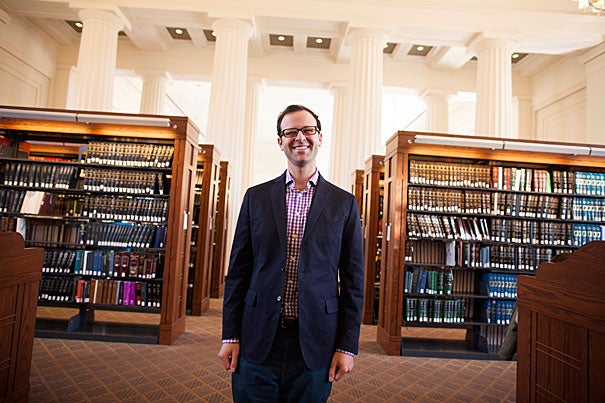Law School graduate Elliot Schwab multitasks, from music to real estate to Talmudic studies
This is one in a series of profiles showcasing some of Harvard’s stellar graduates.
Let’s just say that Elliot Schwab knows how to multitask.
While at Harvard Law School (HLS), he worked for an Israeli supreme court judge, raised two small children with his wife, studied Talmudic law, labored on a U.S. Supreme Court petition, served as a project manager for an international legal and policy consulting firm, took classes at Harvard Business School and Harvard College, and prepared for a career in real estate law, all while doing pro bono work with aspiring musicians.
Oh, and he’s a songwriter too.
“I have a hard time turning down cool opportunities that arise,” said Schwab, who will head to New York with his family for a job with the firm Simpson Thacher after graduation. “And in a place like Harvard, cool opportunities arise all the time.”
The New York native’s route to Cambridge was less traditional than the average HLS student’s. Schwab had studied exclusively in yeshivas in the United States and Israel, educational institutions whose prime focus is on ancient Jewish law. The work perfectly prepared him for HLS and beyond, he said, teaching him how to analyze theoretical underpinnings and providing him with “a strong foundation in moral, religious, cultural, and ethical spheres.
“That sort of an education turns out to be excellent training for law school and life.”
But Schwab’s life could have taken a very different turn during his first HLS year when the music production team behind artists such as Lady Gaga, Moby, and Linkin Park came calling after hearing one of his demos.
Schwab’s formal musical training amounted to a few years playing the piano as a child, but he always loved “thinking holistically about chords and the relationships between notes.” As a teen, he taught himself the guitar, harmonica, and ukulele, and dabbled in songwriting.
In 2009, as a first anniversary present to his wife, Aliza, he recorded her a song in Israel. She begged him to do another. He recorded a handful of songs and then reached out to local music producers, hoping they might produce his work with other artists.
“I was persistent. I kept recording more songs and harassing their email inboxes until somebody started listening.”
Listen they did. Schwab knew he’d found success when he hopped into a Jerusalem taxi during a clerkship for an Israeli judge last summer, and one of his songs started playing on the radio. “It has been both humbling and encouraging to shoot for a seemingly unattainable goal, work hard to realize it, and then watch my efforts reach fruition and snowball,” he said.
His musical experience came in handy at HLS. He provided free counsel to music industry artists and producers through the School’s Recording Artists Project clinic. He also helped craft a petition to the U.S. Supreme Court with HLS Professor Charles Nesson that urged the court to hear the case of Joel Tenenbaum, a Boston University student sued by the recording industry and fined by federal courts for illegally downloading and distributing songs.
It also was a priority for Schwab to maintain his Talmudic studies. And he worked closely with HLS professors Alan Dershowitz and Noah Feldman, helping them with research and book projects.
When he wasn’t busy at HLS, or writing the occasional song, one of Schwab’s favorite pastimes was hosting dinners at his home in Brighton with his wife and children Shimon, four, and Yisrael, two.
“At Harvard Law School there are so many brilliant, talented, and fascinating people coming from a diverse array of backgrounds. There were so many people from whom to learn and this was a great way of connecting.”
There were many opportunities to seize at HLS. For the man who always loves to do more, Harvard was the perfect fit, though he didn’t necessarily know that coming in.
“I was very excited, but also a bit nervous, and didn’t know what to expect,” said Schwab. “My experience here has surpassed my very high expectations. I know that sounds cliché, but it’s really true.”
This post originally appeared on May 29, 2014 on the Harvard Gazette.
